Devoney Looser's Blog, page 11
February 8, 2016
Jane Austen & Zombies: AZ Midday with Destry Jetton
English professors don't often get to be on live television! So grateful for the chance to talk Jane Austen and Pride & Prejudice & Zombies on Arizona Midday (NBC 12 Phoenix). You can see the 3-minute video clip at http://www.12news.com/videos/entertainment/television/programs/arizona-midday/2016/02/05/jane-austen-vs-zombies/79891774/ 



Published on February 08, 2016 10:58
February 5, 2016
Mixing it up in EW with zombie expert Clark Collis
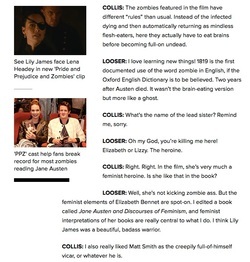 Well, this has been a strange, fun, fantastic, and absolutely non-undead week. I had a chance to weigh in as the (alas, temporary!) resident Jane Austen expert in Entertainment Weekly, in "Ultimate Fan Face-Off: Pride and Prejudice and Zombies" Thanks to zombie expert @ClarkCollis for the chance to mix it up, laugh, and learn a few things, too.
Well, this has been a strange, fun, fantastic, and absolutely non-undead week. I had a chance to weigh in as the (alas, temporary!) resident Jane Austen expert in Entertainment Weekly, in "Ultimate Fan Face-Off: Pride and Prejudice and Zombies" Thanks to zombie expert @ClarkCollis for the chance to mix it up, laugh, and learn a few things, too.
Published on February 05, 2016 13:01
February 3, 2016
Quoted as "Jane Austen Superfan" in USA Today
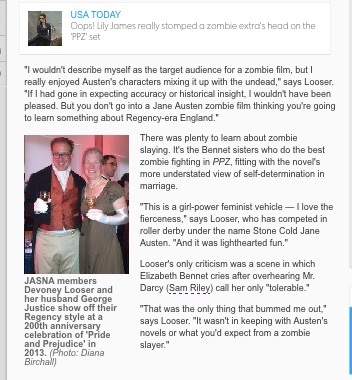 I'm one of the Jane Austen superfans quoted and pictured in a Pride & Prejudice & Zombies piece in USA Today, along with Among the Janeites author Deborah Yaffe and JASNA-NY's Kerri Spennicchia, Thanks to fabulous USA Today writer Bryan Alexander for not making us out to be any more ridiculous than we actually are! (Photo credit to my superfriend, Diana Birchall.) It's a great time to be a Jane Austen scholar and a Janeite.
I'm one of the Jane Austen superfans quoted and pictured in a Pride & Prejudice & Zombies piece in USA Today, along with Among the Janeites author Deborah Yaffe and JASNA-NY's Kerri Spennicchia, Thanks to fabulous USA Today writer Bryan Alexander for not making us out to be any more ridiculous than we actually are! (Photo credit to my superfriend, Diana Birchall.) It's a great time to be a Jane Austen scholar and a Janeite.
Published on February 03, 2016 10:46
January 11, 2016
Cambridge Companion to Women's Writing in the Romantic Period: Choice Outstanding Academic Title
I'm so pleased to share the good news: a collection of essays I edited,The Cambridge Companion to Women's Writing in the Romantic Period (2015) has been named a Choice Outstanding Academic Title. I'm incredibly grateful to editor Linda Bree (pictured bel0w), Cambridge University Press, and the fantastic contributors who made the volume an award-winning one. Those contributors are Stephen Behrendt, Anthony Mandal, Catherine Burroughs, Anne Mellor, Angela Wright, Elizabeth A. Fay, Crystal Lake, Catherine Ingrassia, Caroline Franklin, Deidre Coleman, Julie A. Carlson, Jacqueline M. Labbe, Devoney Looser, Fiona Price, and Jillian Heydt-Stevenson. Check out the table of contents, preface, and an excerpt from the book on the CUP website. 
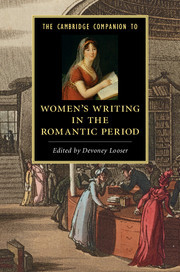


Published on January 11, 2016 10:28
January 5, 2016
The Allrounder: Questions for the Panel
Year-End Sports Roundup! I'm pleased once again to have been invited to contribute to The Allrounder’s Questions for the Panel on Sports Story of the Year and Sports Figure of the Year. If you aren't already reading the site and following @theallrounderco, this is a great time to start.


Published on January 05, 2016 08:21
Keeping Jane Austen Weird at MLA in Austin, TX
Join us for session #548. at the Modern Language Association Convention in Austin, TX this week, for "The Public Jane Austen in Austin; or, How to Keep Austen Weird." The session will be held on Saturday, 9 January, 12:00 noon–1:15 p.m. in room 8C of the Austin Convention Center.
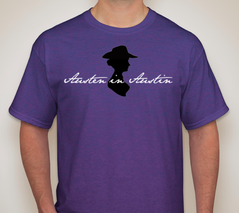 Speaker bios and my short introduction to the session are also below. Janine Barchas promises to be wearing this t-shirt!
Speaker bios and my short introduction to the session are also below. Janine Barchas promises to be wearing this t-shirt!
Presiding: Devoney Looser, Arizona State Univ., Tempe
1. "Jane Austen and the 'After 9/11' Question," Mary Ann O'Farrell, Texas A&M Univ., College Station
2. "Will and Jane, at Four Hundred and Two Hundred," Janine G. Barchas, Univ. of Texas, Austin; Kristina
Marie Straub, Carnegie Mellon Univ.
3. "Some Like It Hot: Love and Sex with Jane Austen," Nora Nachumi, Stern Coll. for Women
keywords: Austen, Novel, Celebrity, History, Reception Presiding: Devoney Looser, Arizona State Univ., Tempe
Session Introduction: Austin, TX has a beloved slogan, “Keep Austin Weird,” so it’s only fitting that we’d have a chance to talk about keeping Jane Austen weird at the Austin MLA. Jane Austen’s weirdness at the Convention is notorious, perhaps never more so than in 1989, the year Eve Sedgwick gave her brilliant MLA paper with its famous and infamous title, “Jane Austen and the Masturbating Girl.” As Sedgwick herself would later write, her title became the “Q. E. D. of phobic narratives about the degeneracy of academic discourse in the humanities” (Tendencies, p. 109). This moment may be either a high point or a low point in Jane Austen’s academic afterlife, depending on your perspective, but it's a moment that continues to resonate. I was in conversation recently with a retired eighteenth-century professor who dates his decision never to return to MLA to the appearance of “Jane Austen and the Masturbating Girl." So even in 2016, Jane Austen’s weirdness continues to have exceptional rhetorical power in our profession and beyond. I do not know whether anything so notorious or incendiary is going to happen at this session. All I can say is that on that question is that I consider myself, like Captain Wentworth, to be half agony, half hope. It’s my pleasure to introduce our four speakers and their three tantalizing-sounding papers.
1. "Jane Austen and the 'After 9/11' Question," Mary Ann O'Farrell, Texas A&M Univ., College Station
Mary Ann O’Farrell is Associate Professor of English at Texas A&M University in College Station. She is the author of Telling Complexions: The Nineteenth-century English Novel and the Blush (Duke, 1997) and co-editor of Virtual Gender: Fantasies of Subjectivity and Embodiment (Michigan, 1999). Her most recent articles have appeared in PMLA, Persuasions, and The Henry James Review. Her work on the novel engages the traditions and practices of manners and the relationship between materiality and knowing. She is completing a book on Austen’s appearances in contemporary popular culture and political discourse.
2. "Will and Jane, at Four Hundred and Two Hundred," Janine G. Barchas, Univ. of Texas, Austin; Kristina
Marie Straub, Carnegie Mellon Univ.
Janine Barchas teaches Austen right here in Austin as Professor of English at UT. Her most recent book is Matters of Fact in Jane Austen: History, Location, and Celebrity (Johns Hopkins UP) and her most recent project is the “What Jane Saw” website, which digitally reconstructs two Georgian museum exhibitions witnessed by Jane Austen in 1796 and 1813. Together with Kristina Straub, she is co-curator of an upcoming brick-and-mortar exhibition, entitled “Will & Jane: Shakespeare, Austen, and the Cult of Celebrity,” at the Folger Shakespeare Library in fall 2016.
Kristina Straub is Professor of Literary and Cultural Studies at Carnegie Mellon University where she teaches eighteenth-century British studies, performance studies, gender studies, and sexuality studies. She is most recently the author of Domestic Affairs: Intimacy, Eroticism, and Violence Between Servants and Masters in Eighteenth Century Britain (Johns Hopkins University Press, 2009) and is currently co-curating “Will & Jane” with Janine Barchas, working on a new anthology and sourcebook of eighteenth-century drama (with Misty Anderson and Daniel O’Quinn) for Routledge Press, and a book on performances of masculinity in Shakespearean theatrical productions in eighteenth-century London.
3. "Some Like It Hot: Love and Sex with Jane Austen," Nora Nachumi, Stern Coll. for Women
Nora Nachumi is an Associate Professor in the Department of English at Stern College for Women, which is part of Yeshiva University in NYC. Since the publication of her book, Acting Like a Lady, in 2008, she has been dividing her time between eighteenth-century celebrity culture and Jane Austen and film. "Some Like It Hot" is inspired by her work on a collection of original essays by novelists, filmmakers, denizens of the internet and scholars of Austen (including this session’s participants Looser and O’Farrell) entitled Doing Jane Austen: How We Talk About Love and Sex When We Talk About Austen.
 Speaker bios and my short introduction to the session are also below. Janine Barchas promises to be wearing this t-shirt!
Speaker bios and my short introduction to the session are also below. Janine Barchas promises to be wearing this t-shirt! Presiding: Devoney Looser, Arizona State Univ., Tempe
1. "Jane Austen and the 'After 9/11' Question," Mary Ann O'Farrell, Texas A&M Univ., College Station
2. "Will and Jane, at Four Hundred and Two Hundred," Janine G. Barchas, Univ. of Texas, Austin; Kristina
Marie Straub, Carnegie Mellon Univ.
3. "Some Like It Hot: Love and Sex with Jane Austen," Nora Nachumi, Stern Coll. for Women
keywords: Austen, Novel, Celebrity, History, Reception Presiding: Devoney Looser, Arizona State Univ., Tempe
Session Introduction: Austin, TX has a beloved slogan, “Keep Austin Weird,” so it’s only fitting that we’d have a chance to talk about keeping Jane Austen weird at the Austin MLA. Jane Austen’s weirdness at the Convention is notorious, perhaps never more so than in 1989, the year Eve Sedgwick gave her brilliant MLA paper with its famous and infamous title, “Jane Austen and the Masturbating Girl.” As Sedgwick herself would later write, her title became the “Q. E. D. of phobic narratives about the degeneracy of academic discourse in the humanities” (Tendencies, p. 109). This moment may be either a high point or a low point in Jane Austen’s academic afterlife, depending on your perspective, but it's a moment that continues to resonate. I was in conversation recently with a retired eighteenth-century professor who dates his decision never to return to MLA to the appearance of “Jane Austen and the Masturbating Girl." So even in 2016, Jane Austen’s weirdness continues to have exceptional rhetorical power in our profession and beyond. I do not know whether anything so notorious or incendiary is going to happen at this session. All I can say is that on that question is that I consider myself, like Captain Wentworth, to be half agony, half hope. It’s my pleasure to introduce our four speakers and their three tantalizing-sounding papers.
1. "Jane Austen and the 'After 9/11' Question," Mary Ann O'Farrell, Texas A&M Univ., College Station
Mary Ann O’Farrell is Associate Professor of English at Texas A&M University in College Station. She is the author of Telling Complexions: The Nineteenth-century English Novel and the Blush (Duke, 1997) and co-editor of Virtual Gender: Fantasies of Subjectivity and Embodiment (Michigan, 1999). Her most recent articles have appeared in PMLA, Persuasions, and The Henry James Review. Her work on the novel engages the traditions and practices of manners and the relationship between materiality and knowing. She is completing a book on Austen’s appearances in contemporary popular culture and political discourse.
2. "Will and Jane, at Four Hundred and Two Hundred," Janine G. Barchas, Univ. of Texas, Austin; Kristina
Marie Straub, Carnegie Mellon Univ.
Janine Barchas teaches Austen right here in Austin as Professor of English at UT. Her most recent book is Matters of Fact in Jane Austen: History, Location, and Celebrity (Johns Hopkins UP) and her most recent project is the “What Jane Saw” website, which digitally reconstructs two Georgian museum exhibitions witnessed by Jane Austen in 1796 and 1813. Together with Kristina Straub, she is co-curator of an upcoming brick-and-mortar exhibition, entitled “Will & Jane: Shakespeare, Austen, and the Cult of Celebrity,” at the Folger Shakespeare Library in fall 2016.
Kristina Straub is Professor of Literary and Cultural Studies at Carnegie Mellon University where she teaches eighteenth-century British studies, performance studies, gender studies, and sexuality studies. She is most recently the author of Domestic Affairs: Intimacy, Eroticism, and Violence Between Servants and Masters in Eighteenth Century Britain (Johns Hopkins University Press, 2009) and is currently co-curating “Will & Jane” with Janine Barchas, working on a new anthology and sourcebook of eighteenth-century drama (with Misty Anderson and Daniel O’Quinn) for Routledge Press, and a book on performances of masculinity in Shakespearean theatrical productions in eighteenth-century London.
3. "Some Like It Hot: Love and Sex with Jane Austen," Nora Nachumi, Stern Coll. for Women
Nora Nachumi is an Associate Professor in the Department of English at Stern College for Women, which is part of Yeshiva University in NYC. Since the publication of her book, Acting Like a Lady, in 2008, she has been dividing her time between eighteenth-century celebrity culture and Jane Austen and film. "Some Like It Hot" is inspired by her work on a collection of original essays by novelists, filmmakers, denizens of the internet and scholars of Austen (including this session’s participants Looser and O’Farrell) entitled Doing Jane Austen: How We Talk About Love and Sex When We Talk About Austen.
Published on January 05, 2016 08:13
December 23, 2015
Jane Austen's Emma Turns 200: Literary Hub
Happy 200th, Jane Austen's Emma! I got to share my perfect happiness about that novel's enduring relevance over on Literary Hub today. (Spoiler: Cat People reference.) 
 Meanwhile, over on Twitter: Published 200 years ago today, Jane Austen's Emma and Directions for Preparing Manure from Peat. See above essay on why I believe Emma may be the better book.
Meanwhile, over on Twitter: Published 200 years ago today, Jane Austen's Emma and Directions for Preparing Manure from Peat. See above essay on why I believe Emma may be the better book.

 Meanwhile, over on Twitter: Published 200 years ago today, Jane Austen's Emma and Directions for Preparing Manure from Peat. See above essay on why I believe Emma may be the better book.
Meanwhile, over on Twitter: Published 200 years ago today, Jane Austen's Emma and Directions for Preparing Manure from Peat. See above essay on why I believe Emma may be the better book.
Published on December 23, 2015 05:46
December 12, 2015
Edition of A Gossip's Story Published
Still looking for that perfect stocking stuffer for your Janeite and/or rumor-mongering bibliophilic loved one? How about buying "the eighteenth-century bestseller that may have inspired Jane Austen's Sense and Sensibility republished for the first time in a modern edition"? Our edition of Jane West's A Gossip's Story (1796) is now available from Valancourt Books!
I co-edited this book with then-Mizzou Undergraduate Research Scholar Melinda O'Connell (now MU BA English) and with then-Mizzou PhD student (now MU PhD English) Caitlin Kelly over many years. I'm grateful to them for their collaboration. All three of us are big fans of Valancourt's publisher and editor extraordinare, Jay Jenkins, for his belief in (and patience with!) this project.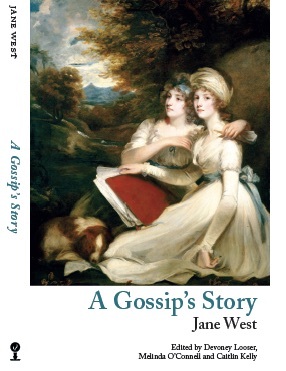
I co-edited this book with then-Mizzou Undergraduate Research Scholar Melinda O'Connell (now MU BA English) and with then-Mizzou PhD student (now MU PhD English) Caitlin Kelly over many years. I'm grateful to them for their collaboration. All three of us are big fans of Valancourt's publisher and editor extraordinare, Jay Jenkins, for his belief in (and patience with!) this project.

Published on December 12, 2015 09:18
November 22, 2015
"Me and My Shadow CV" in SAS Confidential Blog
Those of us in higher education know @AcademicsSay (aka "Shit Academics Say"), by Prof. Nathan Hall, as one of the most hilarious, sustaining things to look forward to in our workday. SAS has started a new blog, SAS Confidential, and I'm so pleased that he chose to add my essay, "Me and My Shadow CV" (originally in the
Chronicle of Higher Education
) to his curated content. Many thanks to those readers who have written me to say they've found this piece useful or comforting. As awful as academic rejection is, at its best, it can be reorienting and motivating. 

Published on November 22, 2015 15:22
November 13, 2015
Mizzou Legacy: The Long View that Concerned Student 1950 Inspires
I have a piece in Inside Higher Ed today, reflecting on university race relations, now and then: ."Mizzou Legacy" I am grateful to all of the students, staff, faculty, and administrators who are still working to realize visions of fairness and equality at our institutions of higher education, rather than to ignore or obstruct them. 

Published on November 13, 2015 09:59



